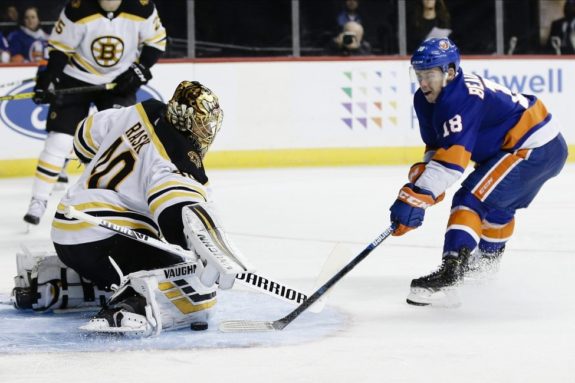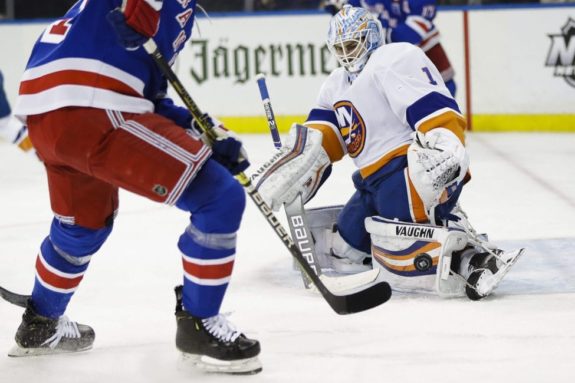Before yesterday’s loss, it had been 16 years since the New York Islanders played on Leap Day. The last time was a 3-2 overtime loss to the Pittsburgh Penguins in 2004. The pre-lockout Penguins were in a tailspin that eventually led to picking Evgeni Malkin and Sidney Crosby in consecutive years, but that didn’t stop Ryan Malone from solving Islanders goaltender Garth Snow to win the game.
Related: Islanders Land Pageau from Senators
Yesterday, the Islanders fell to the NHL-leading Boston Bruins 4-0, making their Leap Day record 1-3-1 lifetime. During that game — the Bruins’ 10th-straight road win against the Islanders — they continued to make mistakes that have ailed them over the course of February, a departure from their success earlier this season.
Poor Puck Management
Prior to yesterday’s loss, the Islanders found a way to push two games to overtime, albeit in a dramatically different fashion. Against the New York Rangers, the Islanders roared back in the third period with two goals to tie the game. The following match, they managed to hold off the Western Conference-leading St. Louis Blues on ’90s night during regulation, but Thomas Greiss couldn’t stop a wraparound in extra time.
In both losses, poor puck management was to blame for the opposing team gaining possession that led to the game-winning goal. Against the Rangers, Anthony Beauvillier’s east-west move at the blue line made it easy for Artemi Panarin to pick his pocket and go the other way. Three Islanders surrounded Panarin, leaving Mika Zibanejad all alone in the high slot to drive the puck home against Semyon Varlamov.
Against the Blues, Devon Toews’ pass on the half-wall back to the point didn’t reach his intended target, Beauvillier, and instead skipped to Colton Parayko, who had plenty of time and space to get the puck to the net. There have been other instances over the course of February where the Islanders have made questionable moves and passes at the blue line, and if they plan on competing in the playoffs, they need to manage the puck better, especially getting into the zone.
Back to Basics
Too often the Islanders, specifically Mathew Barzal, have been guilty of trying to make a move at the blue line with opposing players within reach, allowing them to go the other way on an odd-man break. Butch Goring, whose number was retired yesterday at Nassau Coliseum, can be heard during the MSG broadcasts that the Islanders’ forwards need to get the puck in deep and play the gritty “chip and chase” game.

Like the Bruins effectively did yesterday, the Islanders suffocated teams in their own end with wave after wave of forechecking forwards after a simple dump in. Earlier this season, the Islanders were effective with this approach to the point where analysts around the league began to look into the Islanders game. The results were obvious — eliminate opportunities to turn the puck over while your team is vulnerable.
The less risk you take entering the offensive zone, whether by dumping the puck in at a high rate or being selective in how you attempt to enter the zone with possession, the lower your odds of turning the puck over and risking a dangerous chance against.
So not only were the Islanders managing the puck better, specifically at five-on-five, they were recovering pucks better than most teams in the league.
The Isles ranked 4th last season and rank 2nd this season in the percentage of their dump-ins they recover. Carry the puck in if there’s a safe option to do so, if not, dump it in but with a plan to get it back.
Three-on-three overtime is a different beast; without five players on the ice, it’s much riskier to dump the puck and turn over possession. However, that doesn’t change the fact that the Islanders need to make much better decisions at the opposing team’s blue line or just inside their zone. In both of the aforementioned instances, the team had opportunities to place the puck in spaces to retrieve it or to safely make a change and manage the oncoming rush. Instead, in the name of possession, they tried to find an open man behind them, a favorite overtime play throughout the league.

But it’s been some time since three-on-three was introduced, and players and coaches have caught on to how teams attempt to gain speed through the neutral zone. That means the Islanders need to be more cognizant of how they enter the zone and the opposing players stepping up to disrupt their entry.
Related: Barzal Learning Lessons the Hard Way Under Trotz
If they continue to make mistakes like they have the last handful of games, the Islanders will be digging the puck out of their net and it’ll be a long March for everyone. They received help last night as the Montreal Canadiens defeated the Carolina Hurricanes and the San Jose Sharks beat the Penguins.
They likely won’t be this lucky over the next month and are in control of their playoff chances with games in hand over the Columbus Blue Jackets. Of the Islanders’ last 18 games, 8 are against teams that are currently in a playoff spot as of March 1. They’ll try to get the ball rolling on Tuesday against the struggling Canadiens.
Get the latest New York Islanders news, rumors, commentary and analysis